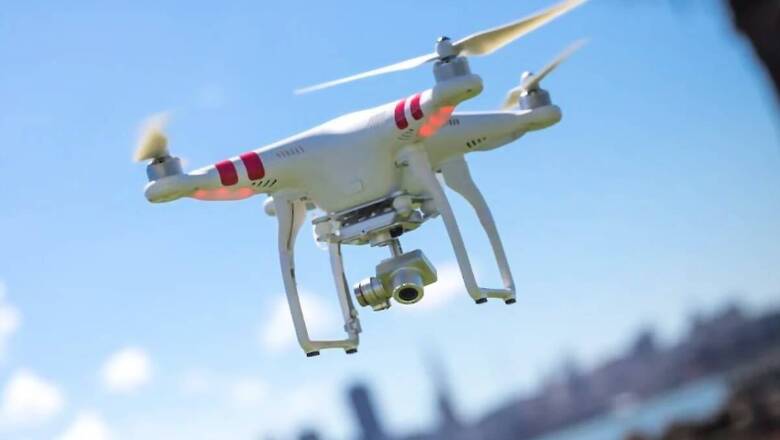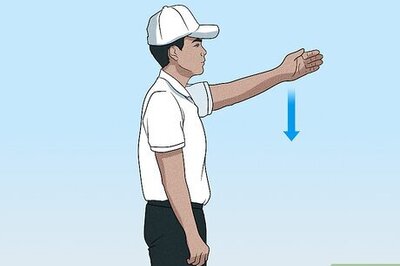
views
If you thought drones were only some fancy toys or at the most meant for courier package and pizza deliveries, you’d be wrong. Very wrong. There is serious consideration for using unmanned drones to deliver the COVID vaccines in certain regions of the country, particularly the remote areas. It hasn’t happened yet, but there is a genuine attempt to give this a chance. The Government of Telangana has launched a project to check the feasibility of delivering vaccine supplies using drones, something that would significantly speed up the process of getting vaccines to the citizens. Flipkart and Dunzo are part of the tests. At the same time, the Indian Council of Medical Research (ICMR) has sought bids from drone operators in India, with the aim to develop a model for vaccine delivery that is feasible and can cover difficult to reach regions.
The government of Telangana’s pilot project is part of the ‘Medicine from the Sky” project of the World Economic Forum and has clinical representation from Apollo Hospitals. “Medical supply chain challenges are often related to public infrastructure gaps. Poor roads over difficult terrain, supply routes that are washed out during monsoons and lack of electricity in many areas directly relate to supply chain shortcomings,” says the WEF briefing paper, for the project. Taking part in this project with the government of Telangana are ecommerce platforms Flipkart and Dunzo. Flipkart will be sharing its learnings from their supply chain deployment of drones, and how those can be tweaked for delivering medical supplies. Flipkart will also share geo-location and tracking expertise, something they deploy extensively for every order delivery.
The Google-backed hyperlocal delivery and ecommerce platform Dunzo, which is already part of the Dunzo Air Consortium for testing Beyond Visual Line of Sight (BVLOS) drone deliveries, will also be plugging in its research int the Medicine from the Sky project, along with the Telangana government. “We believe our participation in the ‘Medicine from the Sky’ project will facilitate a more connected state and country, allowing people almost instantaneous access to vaccines and medicines from the most populous to most remote areas in India in the near future,” says Kabeer Biswas, CEO, and Founder, Dunzo Digital, in a statement shared with the media. “This project is one of the first such programs in the country where multiple drones would fly BVLOS to establish their value proposition for the healthcare supply chain. The vision is to ensure healthcare equity for rural areas,” says Jayesh Ranjan, IAS, Principal Secretary, ITE&C Department, Government of Telangana, in an official statement.
It was in April this year when the Telangana government was granted permission by the Directorate General of Civil Aviation (DGCA) and Ministry of Civil Aviation (MoCA) for drone experiments with healthcare, for a period of one year. “The Central Government, in exercise of powers conferred by Rule 70 of the UAS Rules, 2021, grants conditional exemption to the Applicant Telangana Government, for a period of one year or until further orders, whichever is earlier, from the UAS Rules 2021 for the purpose of trying out drones for delivery,” said Amber Dubey, MoCA joint secretary, in the order. A week after that, the Ministry of Civil Aviation granted permissions for experimental drone flight operations for deliveries, with BVLOS operations. These permissions are also for a period of one year, and among the 20 consortium that have been granted permissions are Asteria Aerospace Pvt Ltd which is backed by Reliance Industries, ClearSky Flight Consortium, Dunzo Air Consortium, Spicejet Ltd and Terradrone Consortium B.
The tender floated by ICMR on June 11 via HLL Infra Tech Services says that the main objective of tests is to “develop a Medical Supplies delivery model and its feasibility in the field practice area by using UAVs in remote inaccessible (hard to reach) areas in selected locations in India.” The specific requirements for drones, also known as UAV or unmanned aerial vehicles, include a range that is a minimum of 35 km, vertical altitude capabilities of at least 100 meters and the minimum 4kg payload capacity. “The UAV should be capable of returning to home/command station delivery of the payload,” the requirements specify.
Read all the Latest News, Breaking News and Coronavirus News here.
















Comments
0 comment